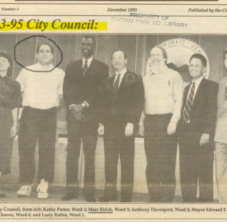You can view Part 1 of the series here, and Part 2 here.
“Maybe we need a formalized format that brings labor and others into an active discussion on what principles we might agree on – heaven knows that Republicans coalesce around their core 19th century beliefs.”
The above “zinger” towards ‘Republicans’ was excerpted from a lengthy public Facebook post on May 11, 2013 by then-Montgomery County Councilmember Marc Elrich in response to MoCo public-sector unions picketing outside the Montgomery County Democrat Central Committee Spring Ball (a lavish affair, no doubt – was caviar on the menu?).
Below is a screen captured image of then-Councilmember Elrich’s beginning to the post, which is also linked above.
It is interesting to see Mr. Elrich smugly posit about a decade ago that “Republicans” have “core 19th century beliefs”. The implication seems to be that “outdated” beliefs on governmental policy and private property and labor laws belong solely to “Republicans” or those “non-Democrats” or perhaps those not in the “Democratic Socialists of America” (a membership Elrich had and likely still has).
No doubt without closed-shop public-sector unions in MoCo getting plum raises every year, there would be child labor everywhere, like at your local CVS Pharmacy.
Mr. Elrich holds many, many retrograde “19th century beliefs”. Some of these beliefs are leading to a decline in Montgomery County’s tax base, resident well-being, prosperity, individual consumer choice and more. Some are just solid beliefs that – hopefully – people of all political parties in America still hold. Let’s briefly explore.
Here are some ideas on the 19th century topic of faith / religion I pulled from Virginia Commonwealth University’s Library and ‘Social Welfare History Project’. According to the author, Dr. Graham Warder, the “19th century beliefs” of Americans was varied but Dr. Warder notes in particular, among the revitalized religious:
The result was a faith that promoted social reforms of various kinds, among them abolitionism, temperance, health reform, and the asylum movement.
Abolitionism – straightforward enough. Does Mr. Elrich not support this “19th century” belief against slavery? I am sure that he does support it. Elrich’s policies do seem to (generally) promote serfdom, however.
Temperance – this ‘movement’ is interesting because it is actually the puritanical Temperance movement that gave rise to alcohol prohibition in America, and then the subsequent removal of the Prohibition Amendment. It was from all of this that the MoCo Department of Liquor Control was re-established in the 1950s. This retrograde monopoly on liquor, wine and beer that Elrich maintains and supports in MoCo is indeed seeded by the 19th century belief in Temperance. It makes it hard to get a quick and affordable beer from the supermarket in MoCo.
Health reform – Mr. Elrich definitely wants health reform, just like the religious zealots of the 19th century. But of course, Elrich is not for individualized medicine or affordable healthcare via cutting edge technologies. No, one-size-fits-all and top-down “Medicare for All” is his bag – with individual insurance being banned. He even once pitched it as a coming “bail out” for the MoCo government worker retiree healthcare fund, which is chronically under-funded by MoCo politicians. Unfortunately for Mr. Elrich, “Medicare for All” is likely not happening any time soon.
Speaking of the 19th century in America, County Exec Elrich channels a 19th century frontier “preacher” or rabble-rouser well in this throwback image (photo lifted from the Elrich campaign’s public Facebook account. It is of Elrich in College Park, MD as a college student.)





